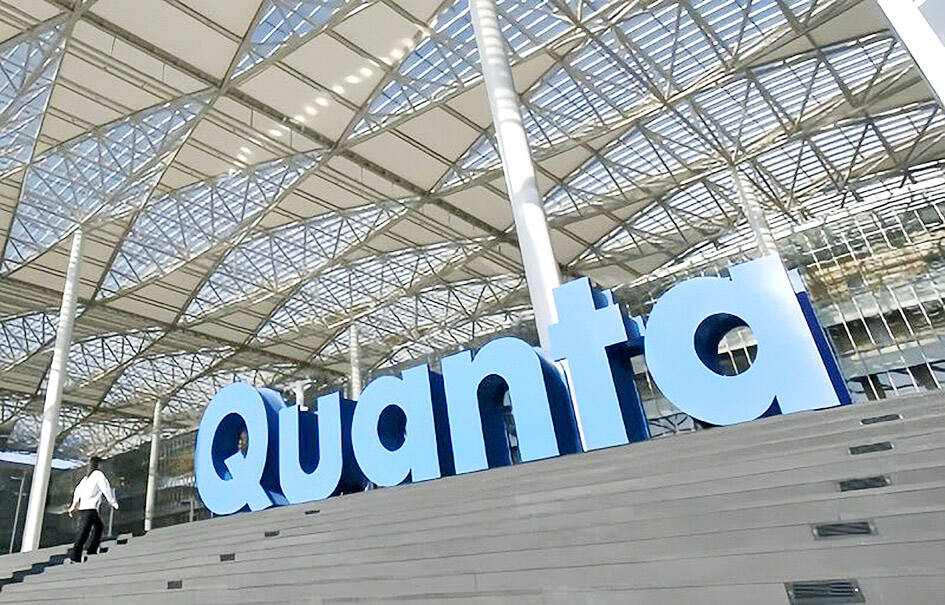Quanta Computer Inc (廣達電腦) yesterday said it is to acquire 7.692 million common shares in Vuzix Corp at US$1.30 per share as part of its long-term investment plans in the US-based maker of smart eyewear.
The share purchase plan was announced after the two companies in November last year entered into a partnership agreement to manufacture next-generation lightweight smart glasses with shipments slated to start later this year.
It is its first tranche of investment in Vuzix, Quanta said in a Taiwan Stock Exchange filing, adding that it would acquire preferred shares of Vuzix during the second and third tranches.

Photo courtesy of Quanta Computer Inc
Quanta’s offer of US$1.30 per share represents a premium of about 51 percent on Vuzix’s closing price of US$0.86 on Friday. US markets were closed on Monday for the Labor Day holiday.
Figures for the second and third tranches have yet to be finalized, but would be less than US$10 million, Quanta said.
The company would hold less than a 19.2 percent stake in the NASDAQ-listed Vuzix after the three tranches are completed, with total investments not exceeding US$20 million, it added.
Vuzix, established in 1997 in Rochester, New York, initially made optical products for the military and the US Department of Defense, but shifted to developing consumer-grade virtual reality (VR) products and is now a leading supplier of smart glasses, and augmented reality (AR) and VR technologies and products.
The deepened partnership between the two firms underscores Quanta’s aim of delivering innovative smart glasses products for the broader markets using waveguides and optical display components sourced from Vuzix, the companies said.
Market researcher TrendForce Corp (集邦科技) said Quanta has been bolstering its technical capabilities in the VR and AR domains in the past few years, and its collaboration with Vuzix is aimed at improving its technology capabilities, providing comprehensive solutions and seizing opportunities in the flourishing virtual market.

Sweeping policy changes under US Secretary of Health and Human Services Robert F. Kennedy Jr are having a chilling effect on vaccine makers as anti-vaccine rhetoric has turned into concrete changes in inoculation schedules and recommendations, investors and executives said. The administration of US President Donald Trump has in the past year upended vaccine recommendations, with the country last month ending its longstanding guidance that all children receive inoculations against flu, hepatitis A and other diseases. The unprecedented changes have led to diminished vaccine usage, hurt the investment case for some biotechs, and created a drag that would likely dent revenues and

Global semiconductor stocks advanced yesterday, as comments by Nvidia Corp chief executive officer Jensen Huang (黃仁勳) at Davos, Switzerland, helped reinforce investor enthusiasm for artificial intelligence (AI). Samsung Electronics Co gained as much as 5 percent to an all-time high, helping drive South Korea’s benchmark KOSPI above 5,000 for the first time. That came after the Philadelphia Semiconductor Index rose more than 3 percent to a fresh record on Wednesday, with a boost from Nvidia. The gains came amid broad risk-on trade after US President Donald Trump withdrew his threat of tariffs on some European nations over backing for Greenland. Huang further

CULPRITS: Factors that affected the slip included falling global crude oil prices, wait-and-see consumer attitudes due to US tariffs and a different Lunar New Year holiday schedule Taiwan’s retail sales ended a nine-year growth streak last year, slipping 0.2 percent from a year earlier as uncertainty over US tariff policies affected demand for durable goods, data released on Friday by the Ministry of Economic Affairs showed. Last year’s retail sales totaled NT$4.84 trillion (US$153.27 billion), down about NT$9.5 billion, or 0.2 percent, from 2024. Despite the decline, the figure was still the second-highest annual sales total on record. Ministry statistics department deputy head Chen Yu-fang (陳玉芳) said sales of cars, motorcycles and related products, which accounted for 17.4 percent of total retail rales last year, fell NT$68.1 billion, or

MediaTek Inc (聯發科) shares yesterday notched their best two-day rally on record, as investors flock to the Taiwanese chip designer on excitement over its tie-up with Google. The Taipei-listed stock jumped 8.59 percent, capping a two-session surge of 19 percent and closing at a fresh all-time high of NT$1,770. That extended a two-month rally on growing awareness of MediaTek’s work on Google’s tensor processing units (TPUs), which are chips used in artificial intelligence (AI) applications. It also highlights how fund managers faced with single-stock limits on their holding of market titan Taiwan Semiconductor Manufacturing Co (TSMC, 台積電) are diversifying into other AI-related firms.